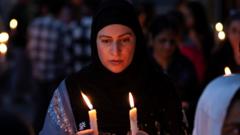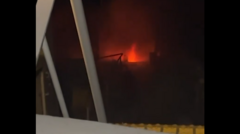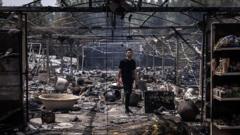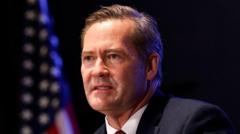Israeli Prime Minister Netanyahu emphasizes protection for the Druze community amidst deadly clashes, while Syria warns against foreign interventions.
Israel Strikes Close to Syrian Presidential Palace Amid Druze Tensions

Israel Strikes Close to Syrian Presidential Palace Amid Druze Tensions
Israeli airstrikes target Damascus area, sending a message to the Syrian regime amid escalating violence in Druze regions.
Israel has intensified its military operations, launching airstrikes near the presidential palace in Damascus, Syria. This action comes as Prime Minister Benjamin Netanyahu sought to convey a decisive warning to the Syrian regime, reaffirming Israel's commitment to safeguarding the Druze religious minority following a surge of sectarian violence.
Prime Minister Netanyahu characterized the military strike as a "clear message" against any threats posed to the Druze community, which has faced increasing violence in recent days. The response from the Syrian government has been terse, underscoring its stance against what it called "foreign intervention", especially in wake of Israel's attacks related to sectarian clashes involving Druze and allied Sunni Islamist groups.
Sheikh Hikmat al-Hijri, the spiritual leader of Syria's Druze population, has expressed grave concerns, labeling the violence a "genocidal campaign" against his people. He called for international forces to help de-escalate tensions and maintain peace in the region. Meanwhile, Syria's government has deployed additional security measures in Druze areas to counter what it describes as “outlaw groups” provoking violence.
According to the Syrian Observatory for Human Rights (SOHR), at least 102 individuals have lost their lives in recent clashes across several areas, including Ashrafiyat Sahnaya and the predominantly Druze region of Suweida. Among the deceased are at least 10 Druze civilians and various fighters, with the situation exacerbated by recent events that ignited sectarian tensions.
The unrest began following the circulation of an audio clip related to an insult against the Prophet Muhammad, which was wrongfully attributed to a Druze cleric. Though he has been cleared by an investigation, the incident has amplified existing enmities, particularly between Sunni Muslims and the Druze minority—a group that represents about 3% of Syria's population.
Syria's interim President Ahmed al-Sharaa has pledged to protect all ethnic and religious minorities within the country amidst fears of broader sectarian violence following the upheaval of Bashar al-Assad's regime. Yet, apprehensions linger among minority groups after experiencing violent reprisals earlier this year.
Netanyahu, during previous statements, has reiterated Israel's zero-tolerance policy towards threats targeting the Druze, while also calling for a comprehensive demilitarization of sensitive regions. The Israeli military continues its operations across Syria, aiming to neutralize military threats while maintaining a presence in the demilitarized zones adjacent to the Golan Heights.
The Israeli-Syrian landscape remains fraught with tension, as both nations navigate the delicate dynamics of an increasingly unstable and divided region, further complicated by the implications of ongoing violence among sectarian groups.
Prime Minister Netanyahu characterized the military strike as a "clear message" against any threats posed to the Druze community, which has faced increasing violence in recent days. The response from the Syrian government has been terse, underscoring its stance against what it called "foreign intervention", especially in wake of Israel's attacks related to sectarian clashes involving Druze and allied Sunni Islamist groups.
Sheikh Hikmat al-Hijri, the spiritual leader of Syria's Druze population, has expressed grave concerns, labeling the violence a "genocidal campaign" against his people. He called for international forces to help de-escalate tensions and maintain peace in the region. Meanwhile, Syria's government has deployed additional security measures in Druze areas to counter what it describes as “outlaw groups” provoking violence.
According to the Syrian Observatory for Human Rights (SOHR), at least 102 individuals have lost their lives in recent clashes across several areas, including Ashrafiyat Sahnaya and the predominantly Druze region of Suweida. Among the deceased are at least 10 Druze civilians and various fighters, with the situation exacerbated by recent events that ignited sectarian tensions.
The unrest began following the circulation of an audio clip related to an insult against the Prophet Muhammad, which was wrongfully attributed to a Druze cleric. Though he has been cleared by an investigation, the incident has amplified existing enmities, particularly between Sunni Muslims and the Druze minority—a group that represents about 3% of Syria's population.
Syria's interim President Ahmed al-Sharaa has pledged to protect all ethnic and religious minorities within the country amidst fears of broader sectarian violence following the upheaval of Bashar al-Assad's regime. Yet, apprehensions linger among minority groups after experiencing violent reprisals earlier this year.
Netanyahu, during previous statements, has reiterated Israel's zero-tolerance policy towards threats targeting the Druze, while also calling for a comprehensive demilitarization of sensitive regions. The Israeli military continues its operations across Syria, aiming to neutralize military threats while maintaining a presence in the demilitarized zones adjacent to the Golan Heights.
The Israeli-Syrian landscape remains fraught with tension, as both nations navigate the delicate dynamics of an increasingly unstable and divided region, further complicated by the implications of ongoing violence among sectarian groups.



















